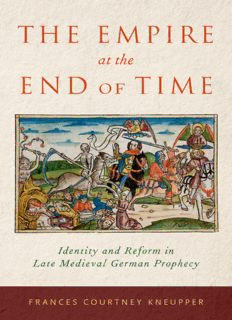
The Empire at the End of Time PDF
Preview The Empire at the End of Time
The Empire at the End of Time The Empire at the End of Time Identity and Reform in Late Medieval German Prophecy Frances courtney Kneupper 3 3 Oxford University Press is a department of the University of Oxford. It furthers the University’s objective of excellence in research, scholarship, and education by publishing worldwide.Oxford is a registered trade mark of Oxford University Press in the UK and certain other countries. Published in the United States of America by Oxford University Press 198 Madison Avenue, New York, NY 10016, United States of America. ©Oxford University Press 2016 All rights reserved. No part of this publication may be reproduced, stored in a retrieval system, or transmitted, in any form or by any means, without the prior permission in writing of Oxford University Press, or as expressly permitted by law, by license, or under terms agreed with the appropriate reproduction rights organization. Inquiries concerning reproduction outside the scope of the above should be sent to the Rights Department, Oxford University Press, at the address above. You must not circulate this work in any other form and you must impose this same condition on any acquirer. Library of Congress Cataloging-in-Publication Data Names: Kneupper, Frances Courtney. Title: The empire at the end of time : identity and reform in late medieval German prophecy / Frances Courtney Kneupper. Description: New York : Oxford University Press, 2016. | Includes bibliographical references and index. Identifiers: LCCN 2015021919 | ISBN 978–0–19–027936–3 (hardback : alk. paper) Subjects: LCSH: Eschatology—History of doctrines—Middle Ages, 600–1500. | Nationalism—Germany—History. | Group identity—Germany—History. Classification: LCC BT819.5 .K66 2016 | DDC 236/.90943—dc23 LC record available at http://lccn.loc.gov/2015021919 9 8 7 6 5 4 3 2 1 Printed by Sheridan, USA To Alan, sine quo non CONTENTS Preface ix Acknowledgments xi Introduction 1 PART I | Context CHAPTER 1 Audience and Reception 19 PART II | Individual Prophecies of Late Medieval German- Speaking Europe CHAPTER 2 The Gamaleon Prophecy 41 CHAPTER 3 The Letter of Brother Sigwalt 66 CHAPTER 4 The Auffahrt Abend Prophecy 88 CHAPTER 5 The Wirsberger Letters 108 PART III | Themes in Late Medieval German Prophecy CHAPTER 6 The Church and Clergy in Prophetic Thought 125 CHAPTER 7 German Identity in Prophetic Thought 149 Conclusion 172 Appendix A: Original Eschatological Prophecies of Late Medieval Upper- German- Speaking Europe 177 Appendix B: Eschatological Prophecies Circulating in Late Medieval Upper- German- Speaking Europe Composed in Previous Centuries or Other Regions 191 Appendix C: Manuscripts Containing Original or Adapted Prophetic Material in Late Medieval Upper- German- Speaking Europe 199 Bibliography 231 Index 247 viii | Contents PREFACE In this book, I refer to “Germans,” “German- speakers,” and “inhabitants of the Empire” to designate a group of people with certain common characteris- tics: namely, their use of the German language and their political membership in the Holy Roman Empire. Yet I write about a time when these designations carried ambiguous meaning. It is a matter of much debate whether German- speakers in the Late Middle Ages felt themselves to be “German,” and whether being “German” had any significance for them. Indeed, it might be suggested that using the term “Germans” to characterize the people discussed herein is to assume a priori that they have a shared identity. I persist in doing so because several prophecies considered in this book employ the word “Deutsch” (or Latin “Germani”) to refer to the people they describe. It is in fact the compos- ers of the prophetic material who suggest that such a group exists and can be named. At the same time, other prophecies do not use the word “Deutsch,” but refer instead to “inhabitants of the Empire.” Thus, “German” was not a fixed, universal category understood by all, but rather one of a set of overlapping terms, reflecting shared, but not identical, ideas and characteristics. I reflect this ambiguity in my use of “Germans,” “German-s peakers,” and “inhabitants of the Empire,” and ask the reader to keep the ambiguous meaning of these categories in mind. Similar challenges arise concerning what to call the region inhabited by these “German” people. No concise label exists. However, as will be discussed in more detail, as the Middle Ages came to a close there was a growing sense that the German- speaking parts of the Empire formed a self-c onscious cultural and political entity. I therefore employ the terms “German-s peaking Europe” and the “Empire” to designate the emerging cultural, political, and linguistic community of the German- speaking regions of the Holy Roman Empire. As language was a strong defining factor, I often describe the region as “German- speaking Europe.” I also refer on occasion to the “German Empire,” because the Empire, while technically the “Holy Roman Empire,” took on an increasingly
Description: